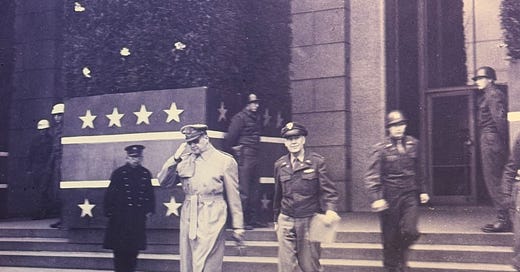This is Part Two (of Two) of “A New World.” Part One covered America’s decision to use Atomic Bombs in WWII—Part Two is about the choices the United States made in the subsequent occupation of Japan from 1945 to 1952, and how those choices created Asia’s most vibrant democracy. To read Part Two, you must be a paid subscriber. You can become one by clicking here.
At 9:04 AM on September 2, 1945 on the deck of the USS Missouri in Tokyo Bay, World War Two officially ended—and so began eight decades of an American-led international order that ended in 2025. On that gray, placid morning, an eleven-man delegation representing Imperial Japan boarded the warship, led by Foreign Minister Mamoru Shigemitsu and General Yoshijiro Umezu. Shigemitsu wore a black tuxedo and a top hat, complete with a cane. Umezu wore his military uniform—along with a chest full of medals. Each of the military men gathered on the ship, be they American, Japanese, Soviet, Chinese, Australian, French or British—wore their medals proudly. After all, the ceremony, which lasted a total of 18 minutes, marked the end of the most destructive war in human history. However, the man to whom the Japanese surrendered—the Supreme Allied Commander for the Allied Powers, five-star General Douglas MacArthur—wore no medals at all.
Keep reading with a 7-day free trial
Subscribe to American Times with Tim Barnicle to keep reading this post and get 7 days of free access to the full post archives.




